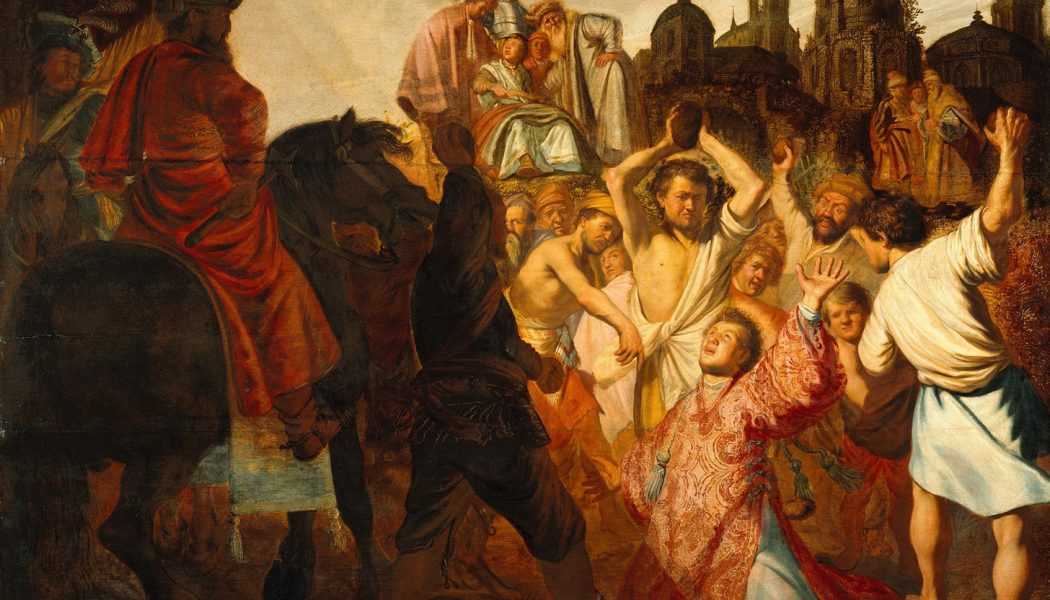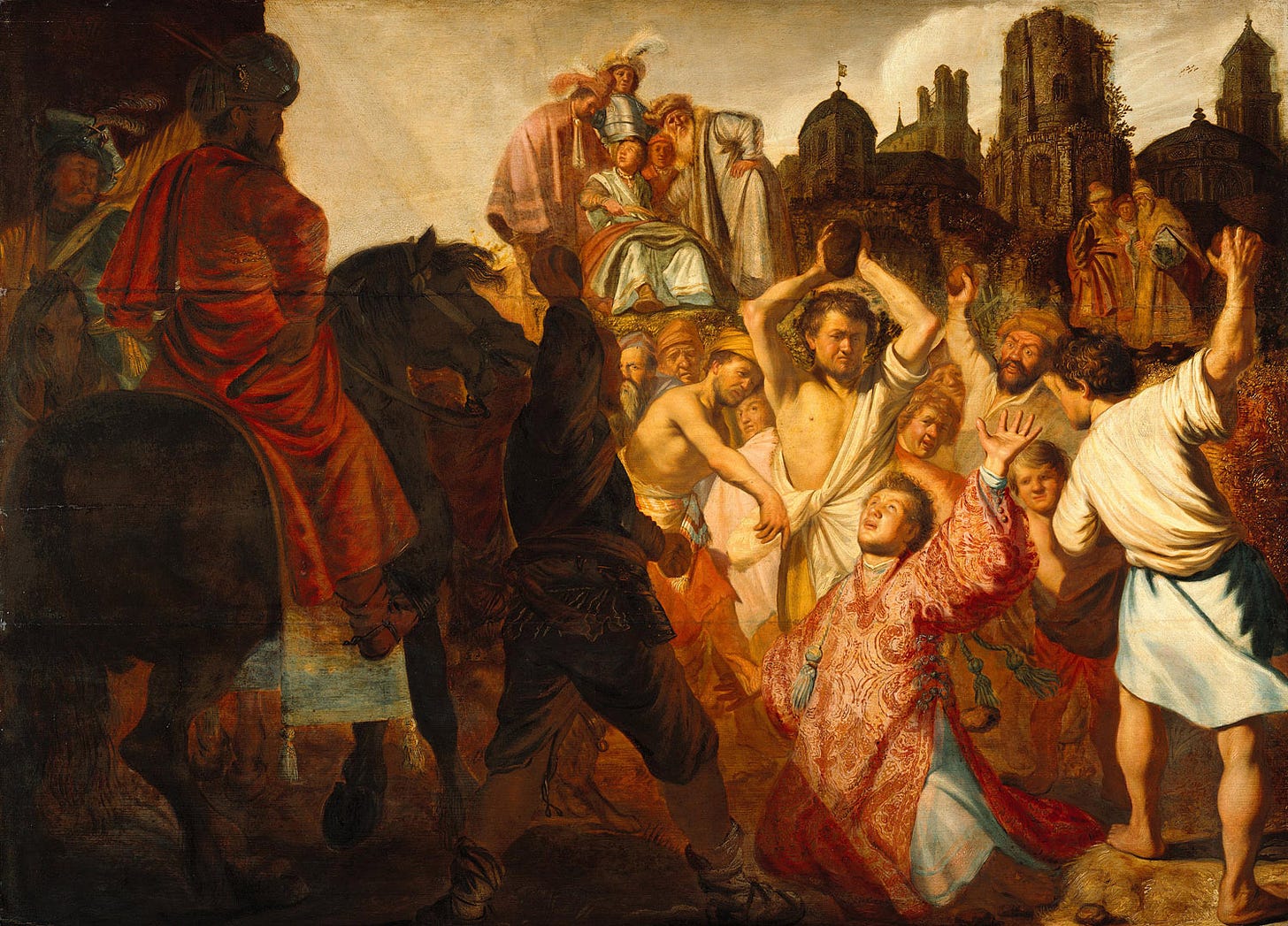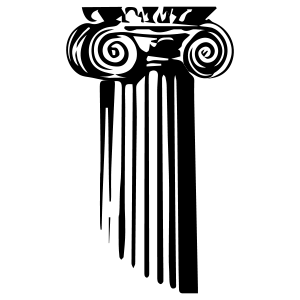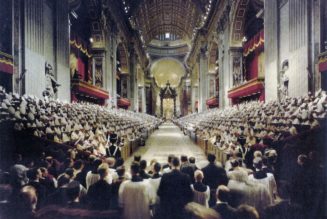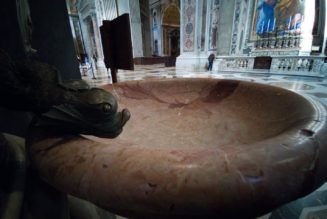Hey everybody,
Today’s first reading, the martyrdom of St. Stephen, is a powerful one.
So is this Rembrandt depiction of the scene.
There are three faces of note in the painting: That of Stephen, looking heavenward and bathed in light; that of Saul, seated in the background of the painting and looking apprehensively toward that light, and that of Rembrandt, who painted himself into the scene, standing just behind St. Stephen.
In the news
Hong Kong:
In Hong Kong this weekend, pro-democracy activists, including newspaper publisher Jimmy Lai, were sentenced to prison terms for violating the 2020 National Security Law that restricts free speech and assembly in the Chinese territory. Lai, a Catholic convert, will spend 14 months in prison for attending civil rights and prayer rallies in 2019.
A priest working in the Hong Kong chancery office told The Pillar Mondaythat:
“The crackdown on free speech is public and meant as an example.”
“Jimmy Lai [being sentenced] is a very clear message: he is pro-free press, pro-democracy, and visibly Catholic, and he’s a warning to all those groups.”
With Hong Kong in political chaos, its diocese has been without a bishop since 2019, as the Vatican’s Congregation for the Evangelization of Peoples (Propaganda fide, as it once was known) has reportedly cycled through choices but delayed a final decision because of the political situation.
One Hong Kong priest told The Pillar that Hong Kong Catholics are deeply concerned about mounting tension:
“In the middle are many Hong Kongers, and many Hong Kong Catholics, who are simply afraid of the situation; they see the tensions mounting and worry they will be caught between the hammer and the anvil.”
Read the most recent news from Hong Kong here.
—
Haiti is a two-hour flight from Miami. That’s not even enough time to watch a movie. But it’s more than enough time to enter a completely different world: Haiti is one of the poorest and least developed countries in the world, and a world away from its close neighbor, the U.S.A.
Haiti’s national history is bookmarked with tragedy and injustice in nearly every generation.
But the Church in Haiti, Pope St. John Paul II said, is marked by youth, vitality, and closeness to the suffering of the Haitian people.
That closeness was expressed on Thursday, when Haitian police fired tear gas into a crowd assembled for a Mass to pray for peace in the country.
Haiti, in the throes of a constitutional crisis, is experiencing a surge of violence that includes arson, the kidnapping of priests and religious sisters, and some crimes nearly unspeakable.
We broke down for you what’s happened in Haiti, why, and what the Church aims to do about it.
What can we do about it? For starters, pray for the Haitian people. And consider supporting the charitable work of the U.S. bishops there.
—
Minneapolis:
As Americans await a verdict in the murder trial of Derek Chauvin, the former police officer who in May 2020 kneeled on George Floyd’s neck for more than nine minutes, Minneapolis Archbishop Bernard Hebda offered a Mass for the Preservation of Peace and Justice. The archbishop urged his priests to do the same.
Hebda prayed that God “would send down wisdom and prudence for the jurors given the weighty responsibility of deciding Mr. Chauvin’s guilt or innocence. That he would help us receive the verdict with wisdom and prudence. That he would open our hearts to whatever conversion is needed there.”
“That he would bless our cities and communities with the fruits of the peace and justice that only he can bring.”
The archbishop explained that in the Mass, seemingly “inconsequential” prayers are united to the sacrifice of Christ on the cross.
“That gives them an efficacy beyond anything we can imagine,” he said.
With the entire city of Minneapolis awaiting the verdict, and the prospect of widespread social conflict, Archbishop Hebda shared his thoughts with The Pillar on the mission of the Church in his archdiocese.
“I strongly feel that the Holy Spirit is prompting our local Church to lead an effort to turn to the Lord as the One who unites us as sisters and brothers. At a time when the most common narrative has been one of division that inevitably leads to conflict, despair and even greater polarization, our Catholic worldview, as recently reflected in Pope Francis’ Fratelli tutti, can speak a word of hope into even the most difficult of situations.”
Read all of Archbishop Hebda’s remarks to The Pillar here.
—
And in the same city, a church in Minneapolis caught fire Monday night, and was demolished by the blaze. The cause of the fire is being investigated.
The church, Sacred Heart of Jesus, is part of an institution called the Polish National Catholic Church.
Maybe you’ve heard of that? Or maybe you vaguely remember reference to it on the back of a missalette at Mass. That’s ok. We’ve taken the liberty of explaining for you what the PNCC is all about.
Two spoilers: It’s not actually from Poland, and it’s not exactly Catholic either.
—
Finally, Friday was Pope emeritus Benedict XVI’s 94th birthday, and Monday was the 16th anniversary of his election to the papacy. We put together a brief highlights reel from Benedict XVI’s tenure as the Bishop of Rome.
—
The synod that isn’t
The Apostolic See last week announced that it will host a three-day theological symposium in February 2022, entitled “Toward a Fundamental Theology of the Priesthood.”
The symposium will be organized by Cardinal Marc Ouellet, prefect of the Congregation for Bishops, who is widely expected to retire from his post at the Vatican dicastery soon, but remain the organizer of the symposium.
Ouellet said the symposium — a gathering of bishops and theologians — will touch questions that have arisen about the priesthood during recent Vatican synods, including the questions of priestly celibacy, dwindling vocations, and the role of women in the Church. He has a broader vision for the event, he’s said, but he told journalists those questions will be at least touched upon.
The most recent synods in Rome haven’t just touched upon those questions. They have been overridden and overshadowed by them.
While synods of bishops are intended to be gatherings for mutual prayer, discussion, and even discernment, the most recent Vatican synods have been treated — both in the media and by some bishop participants — as legislative assemblies, designed to pass some plan of action to be implemented by the pope.
That vision of synods is simply inaccurate. Bishops are called to synods to talk together and with the pope, to offer perspectives and advice — not to promote the “passage” of agenda items or pet projects.
But when media accustomed to the language, structures and power dynamics of secular government frames a synod, and when some bishops arrive with the expectation that “everything will be on the table,” the deeply Christian idea of mutual discernment can too quickly be cheapened, and reduced to the machinations of secular political engagement.
I bring this up because Cardinal Ouellet’s symposium is not even a synod — it is simply a theological conference. At the same time, it’s being framed in some corners — by pundits both for and against — as another opportunity to re-litigate questions discussed at recent synods: modifying the discipline of clerical celibacy, establishing a “diaconate” for women, rethinking the relationship between sacred orders and the care of souls.
The pope has a tendency to let people take discussion where they want to take it — but he’s nevertheless made clear by now his position on those questions. He does not intend to modify a number of basic canonical principles related to them. But those who haven’t gotten the message seem intent on keeping the seemingly interminable discussion center stage.
That discussion has a way of crowding out other important questions that might be talked about, including a deeper theological vision of the collaboration between laity and clergy, a more imaginative sense of clerical formation for the modern world, and a serious look at the costs of an organizational model in which clerics live mostly alone and often feel isolated, with all the incumbent psychological, spiritual, and emotional difficulty that can bring.
A theological symposium should not be a “will they/won’t they” kind of affair. Nor should a synod. And Catholics should get to see these events as more nuanced, more discerning, and less polarized than all of that. But because of how the last few synods have unfolded — and how they have been covered — that will probably take a more imaginative and thoughtful framing, and approach, than what has thus far surrounded the talk about Cardinal Ouellet’s theological conference.
Eucharistic coherence
As we reported last month, the doctrinal committee of the U.S. bishops’ conference is preparing a document on “Eucharistic coherence.” Ed and I have expressed concern that the document, needing to pass the majority of U.S. bishops to be published, may well end up saying very little. We’ve also expressed skepticism that bishops will be willing to engage with each other in a public, direct, and fruitful way over their disagreements on the issue, and could instead end up just talking past each other.
But there is at least one sign that we could be proven wrong.
Last week, Archbishop Samuel Aquila of Denver published an essay in America stating that:
“I am compelled to address the error that any baptized Catholic can receive Communion if he or she simply desires to do so. None of us have the freedom to approach the altar of the Lord without a proper examination of conscience and proper repentance if grave sin has been committed. The Eucharist is a gift, not an entitlement, and the sanctity of that gift is only diminished by unworthy reception. Because of the public scandal caused, this is especially true in the case of public officials who persistently govern in violation of the natural law, particularly the pre-eminent issues of abortion and euthanasia, the taking of innocent life, as well as other actions that fail to uphold the church’s teaching regarding the dignity of life.”
The archbishop expressed his position fairly clearly. Now here’s the interesting part. On Monday, Aquila published a second essay, this time in Catholic World Report, in which he said that he had received pushback on the essay from a fellow bishop:
“He thought that my article gave the impression that the grace available in the sacraments, particularly in the Eucharist, is dependent on the worthiness of the minister or the worthiness of the recipient….
In a response to the bishop I assured him that I made no such claim. Rather, I held, as does the Church, that grace is available ex opere operato, that is, the valid enactment of the sacraments makes available the grace of the sacraments. Thus, neither the minister of the sacrament or the person partaking of the sacrament can diminish the grace of the sacrament. However, how it is received (ex opere operantis), that is, the benefit of receiving the sacrament, is dependent upon the condition of the subject’s spiritual disposition.”
The archbishop said that his interlocutor had asked him to make a “public clarification.”
In short, the archbishop has offered in public his side of a substantive theological debate among bishops on a contentious question. That doesn’t happen everyday, and it could represent the beginning of an actually fruitful theological engagement — which could be catechetical and helpful to the Church — over a controversial subject.
I do, however, note two two points that could hinder that debate:
-
Aquila does not mention the name of the bishop who wrote to him, and that bishop did not make his criticism of Aquila’s position public. One side of a debate is not a debate. If, however, more bishops decide to put their views in print, respectfully and intelligently, they might take a controversy beyond sloganeering, partisanship, and platitudes, and into something more substantive.
-
I have seen no other bishops offer public commentary for or against Aquila’s position. Debate takes more than one voice. There are two months before the bishops meet virtually to discuss this issue. They could engage meaningfully before their Zoom session, but if they don’t, they’re unlikely to do so on a short, time-restricted call.
Final thoughts
— Today is April 20, which where I live in Colorado is celebrated as 4-20, an annual bacchanal to celebrate marijuana, which the state is fast becoming known for. Marijuana is now legal recreationally in 16 states, medically in even more, and decriminalized in nearly all. Unsurprisingly, as legal restrictions fall, polling shows that a growing share of Americans find marijuana usage unobjectionable, or even imbibe themselves.
But the Church has offered very little pastoral guidance on the use of legalized marijuana, and ethicists and moral theologians have expressed competing views — some along the lines of “no, with a but…” and others more akin to “yes, with an if…”
This likely presents pastoral challenges for priests in the confessional, in spiritual direction, and in other ministry settings — and if it doesn’t, it will soon. It seems unsustainable that parish priests should be left to their own devices on a challenge like that. At the moment, I am unaware that this issue is being discussed among bishops and seminary formators, but given the growing prevalence of legalization and normalization, it should be.
— Our invitations last week to Drinks with the Pillar filled up much more quickly than we would have expected. So here are two more invitations to have a Zoom drink with me and Ed. As a reminder, these events are, for the moment, restricted to paying subscribers to The Pillar. But do feel free to sign up for drinks and then subsequently sign up as a subscriber, if you’re not one already.
Sign up here for a Zoom drink with me and Ed on May 10.
Sign up here for a Zoom drink with me and Ed on May 14.
—
My friend Fr. Michael Sweeney, OP, offered a few thoughts last week on personal relationships, proclaiming the faith, and knowing one another by name. I don’t endorse every point he made, and I think some points require further explanation, but the talk gave me food for thought, and I suspect it will for you too:
—
And here’s an old set from a much younger Nate Bergatze, a stand-up who is becoming one of my favorite comics:
—
On a personal note, my son Max has a number of neurological difficulties that have become a greater challenge for him over the decreased socialization of the pandemic, which has been a hard time, of course, for all of us. We have an appointment today for a specialist, and, for his sake, I’m praying it sets him on a path to some relief from those difficulties. I would be immensely grateful for your prayers.
—
Please be assured of our prayers at The Pillar for you, and please continue to pray for us.
Sincerely yours in Christ,
JD Flynn
editor-in-chief
The Pillar
Join Our Telegram Group : Salvation & Prosperity
